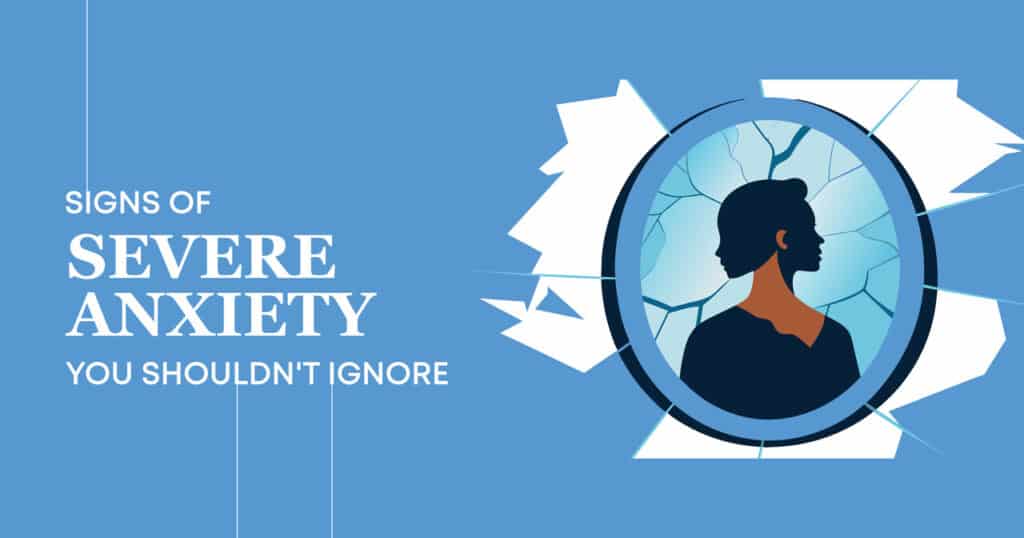Ever feel like your mind is running a mile a minute, and you can’t catch a break? Anxiety can be a normal part of life, but when it becomes overwhelming, it can take a serious toll on your well-being. Recognizing the signs of severe anxiety you shouldn’t ignore is crucial for getting the help you need. Let’s dive into the telltale symptoms of anxiety disorders and learn how to manage them effectively.
What is Severe Anxiety?
Severe anxiety is more than just feeling worried or nervous sometimes. It’s a strong and constant feeling of fear that can mess up your daily life, relationships, and overall feelings. Normal anxiety usually happens because of something specific, but severe anxiety can happen for no apparent reason, which makes it harder to handle.
Physical Signs of Severe Anxiety
- Constantly Feeling Tired
If you’re tired, even after sleeping well, it could be severe anxiety. Your body and mind are always on high alert, which uses up your energy. This constant state of alertness can also lead to various physical symptoms like chest pain and heart palpitations. - Muscle Tension and Pain
Severe anxiety can make your muscles tense and sore. You might feel tightness in your shoulders, neck, or back, causing constant pain and discomfort. This is often accompanied by rapid heartbeat or a racing heart, which are common anxiety symptoms. - Shortness of Breath and Fast Heartbeat
If you have trouble breathing or your heart races without doing any physical activity, it might cause severe anxiety. These symptoms can feel like a heart attack, causing more stress and worry. - Insomnia
Struggling to fall asleep or stay asleep is familiar with severe anxiety. Your mind might be full of worries, making it hard to relax and sleep well. Persistent feelings of worry can contribute to excessive worry, leading to further deterioration in your mental health. - Digestive Problems
Anxiety can upset your stomach, causing cramps, nausea, diarrhea, or constipation. This is called the gut-brain connection, which illustrates how mental health conditions can manifest as physical health conditions.
Emotional and Mental Signs of Severe Anxiety
- Constant Worry and Fear
Always worrying a lot about everyday things is a sign of severe anxiety. It’s hard to stop worrying, which leads to continuous fear. People with anxiety disorders often experience excessive anxiety that interferes with their daily routines. - Irritability and Restlessness
Feeling easily annoyed or unable to relax without an apparent reason can be due to severe anxiety. You might also feel restless, finding it hard to sit still. This can exacerbate behavioral therapy efforts if not managed properly. - Difficulty Concentrating
Severe anxiety can make it hard to focus. Your mind might wander, making it challenging to finish tasks or stay involved in conversations. This is particularly problematic in social situations, where anxiety symptoms can worsen. - Panic Attacks
Panic attacks are sudden episodes of extreme fear or discomfort, with symptoms like sweating, shaking, and chest pain. They can be terrifying and happen without warning. People with panic disorder may experience these unexpected panic attacks regularly. - Avoidance Behavior
Avoiding situations or activities that cause anxiety is common, but it can also be a sign of severe stress. This avoidance behavior can limit your daily activities and social interactions, contributing to social isolation.
When to Seek Help
If you notice any of these signs of severe anxiety, it’s crucial to get help. Here’s what you can do:
- Talk to a Healthcare Professional: A doctor or mental health professional can diagnose and treat anxiety. They might recommend treatment options such as cognitive-behavioral therapy or exposure therapy.
- Consider Therapy: Therapies like behavioral therapy can help manage anxiety symptoms. Effective treatments often include a combination of psychotherapy treatment and anti-anxiety medications.
- Medication: Sometimes, medicine is needed to manage severe anxiety. Selective serotonin reuptake inhibitors (SSRIs) are commonly prescribed.
- Support Groups: Joining a group can give you a sense of community and understanding. Talking with others who understand can help combat feelings of fear and anxiety.
FAQs About Severe Anxiety
- What causes severe anxiety?
A mix of genetic factors, environmental factors, and psychological factors can cause severe stress. Stressful events, trauma, and some medical conditions can also lead to severe anxiety. - Can severe anxiety be cured?
While there’s no cure, severe anxiety can be managed well with therapy, medication, and lifestyle changes. Many people live fulfilling lives with the proper treatment, despite chronic anxiety. - How do I know if I have severe anxiety?
If you have intense anxiety that affects your daily life, see a healthcare provider for an evaluation. They can diagnose anxiety disorders based on your symptoms and history. - What are some self-help strategies for managing severe anxiety?
- Regular Exercise: Physical workout can reduce anxiety and improve mood.
- Mindfulness and Relaxation: Techniques like deep breathing, meditation, and yoga can help you relax.
- Healthy Diet: Eating well affects your overall health and anxiety levels.
- Adequate Sleep: Good sleep habits can help manage anxiety.
- Avoiding Alcohol and Caffeine: These can make anxiety worse.
- Can children and teenagers experience severe anxiety?
Yes, kids and teens can also have severe anxiety. It’s essential to recognize the signs early and get the right help, especially given the increasing rates of mental health disorders in younger populations.
Real-Life Strategies for Managing Severe Anxiety
- Practicing Mindfulness: Focus on the present moment and accept your thoughts and feelings without judgment. This can help reduce anxiety and improve mental health.
- Developing a Routine: Having a daily schedule can provide structure and comfort. Include regular times for meals, exercise, work, and relaxation. This routine can help mitigate feelings of excessive fear.
- Seeking Social Support: Talking to friends and family can give you emotional support and reduce loneliness. Don’t hesitate to reach out when you feel overwhelmed. Support from loved ones can be a powerful tool against anxiety attacks.
- Engaging in Physical Activity: Exercise helps manage anxiety by releasing tension, boosting mood, and improving overall health. Aim for at least 30 minutes of exercise most days. This not only helps with anxiety but also enhances your quality of life.
Wrapping It Up
Recognizing the signs of severe anxiety is the first step to taking care of your psychological health. By understanding the symptoms of anxiety disorders and getting the right help, you can manage stress and improve your life. Remember, asking for help and taking steps toward a healthier, more balanced life is okay.





